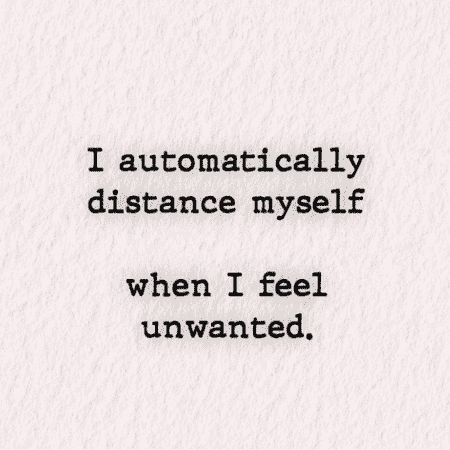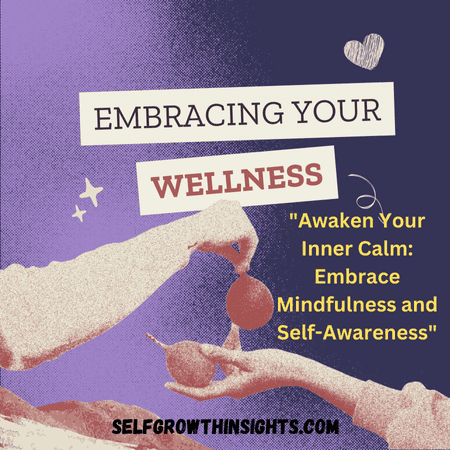Are you someone who tends to distance themselves when they feel unwanted or unappreciated by others? Many individuals have experienced this behavior at some point, but why do we do it? This article will explore the reasons behind this common tendency and provide insights into how to better understand and cope with these feelings. So keep on readings…
Understanding the Need for Distance
When we feel unwanted, it can trigger a range of negative emotions such as sadness, anger, or self-doubt. In an effort to protect ourselves from further emotional pain, we may subconsciously choose to distance ourselves from those who we perceive as causing or contributing to these feelings. This distance serves as a form of self-preservation, allowing us to create space and time to process our emotions and regain a sense of control over our lives.

The Role of Self-Esteem
Our self-esteem plays a significant role in how we respond to feelings of being unwanted. Individuals with low self-esteem may be more prone to interpreting situations as rejection and, as a result, may distance themselves more readily than those with higher self-esteem. By distancing themselves, they can avoid confronting their feelings of inadequacy or unworthiness, albeit temporarily.
Fear of Vulnerability
Another reason why we may distance ourselves when feeling unwanted is due to a fear of being vulnerable. Opening up and expressing our emotions to others can feel intimidating, especially when we fear judgment or further rejection. By withdrawing and creating emotional distance, we can shield ourselves from potential hurt and rejection, even though it may not ultimately address the root of the issue.
Coping Strategies
If you find yourself habitually distancing yourself when feeling unwanted, it may be helpful to explore healthier coping strategies. Instead of isolating yourself, consider the following approaches:
- Communicate:
- Instead of bottling up your emotions, try to communicate openly and honestly with the people involved. Expressing your feelings and concerns can lead to a better understanding and resolution of the underlying issues.
- Seek Support:
- Reach out to trusted friends, family members, or a therapist for support and guidance. Talking to someone who can provide empathy and perspective can help you navigate your emotions more effectively.
- Practice Self-Care:
- Engage in activities that promote self-care and self-love, such as exercise, meditation, or hobbies that bring you joy. Taking care of your physical and emotional well-being is crucial in managing feelings of rejection and unwantedness.
Psychological Reasons for Distancing
At its core, distancing yourself is a defense mechanism. Our brains are wired to protect us from emotional pain. When you sense rejection, your mind might kick into self-preservation mode, pushing you to withdraw to avoid further hurt. This can be linked to a fear of rejection; by distancing yourself first, you avoid the potential sting of someone else doing it to you. Past experiences, especially traumatic ones, play a significant role. If you’ve been hurt before, your brain remembers that pain and tries to shield you from experiencing it again.
Self-Preservation Instinct
The self-preservation instinct is an innate drive in humans to protect themselves from harm. This instinct is not limited to physical danger but also extends to emotional and psychological well-being. When faced with a situation where one feels unwanted or rejected, the self-preservation instinct kicks in to avoid further emotional pain. This can manifest as distancing oneself from the source of hurt, creating a buffer to shield against potential damage to one’s self-esteem and mental health.
Fear of Rejection
Fear of rejection is a powerful motivator for distancing behavior. This fear stems from the anticipation of being unaccepted or unloved by others. When someone fears rejection, they might preemptively withdraw from relationships or social interactions to avoid the emotional pain that comes with being turned away or ignored. This fear often leads to overanalyzing social cues and interpreting neutral or ambiguous signals as negative, reinforcing the decision to distance oneself as a protective measure.
Past Experiences and Trauma
Past experiences, especially those involving trauma or significant emotional pain, play a crucial role in shaping how individuals respond to feelings of being unwanted. If someone has previously experienced rejection, abandonment, or betrayal, their brain may associate these feelings with the need to protect themselves from similar future occurrences.

Signs That You Are Distancing Yourself
Recognizing the signs that you are distancing yourself is crucial. Behaviorally, you might notice avoiding social interactions, declining invitations, or minimizing communication with friends and family. Emotionally, you might feel a sense of numbness, heightened anxiety in social settings, or a pervasive sense of sadness and loneliness.
Behavioral Signs
Behavioral signs that you are distancing yourself can be quite noticeable if you pay attention to them. These signs often include:
- Avoiding Social Interactions: Declining invitations to social events, gatherings, or even casual hangouts with friends and family.
- Minimizing Communication: Reducing the frequency and depth of conversations with others, such as not responding to messages or calls, or keeping interactions very brief.
- Spending More Time Alone: Choosing solitude over company, preferring to stay home rather than going out.
- Withdrawing from Activities: Pull back from hobbies, clubs, or activities that you once enjoyed and where you interacted with others.
- Exhibiting Passive Behavior: Avoiding eye contact, giving monosyllabic answers, or being unengaged during conversations.
- Physical Withdrawal: Physically distancing yourself by sitting far away from others in social settings or avoiding places where you might encounter people you know.
Emotional Signs
Emotional signs are more internal but equally important to recognize. These include:
- Feelings of Numbness: A sense of emotional detachment or numbness, where you feel disconnected from your own feelings and those of others.
- Heightened Anxiety: Increased anxiety in social settings or even at the thought of social interactions, leading to avoidance.
- Pervasive Sadness: A constant feeling of sadness or melancholy that doesn’t seem to lift and is often exacerbated by isolation.
- Increased Irritability: Becoming easily irritated or frustrated, particularly in social situations or when interacting with others.
- Sense of Loneliness: Feeling intensely lonely and believing that others do not understand or care about you.
- Self-Doubt: Persistent thoughts of self-doubt and questioning your worth or place in relationships and social settings.
Mindfulness and Self-Awareness
Mindfulness practices can enhance self-awareness and help you understand your emotions better. Techniques like meditation, journaling, and mindful breathing can ground you in the present moment and reduce anxiety. By becoming more attuned to your thoughts and feelings, you can better manage them and prevent the urge to distance yourself.

The Role of Mindfulness in Understanding Emotions
Mindfulness is a powerful tool for gaining insight into our emotions and reactions. By practicing mindfulness, we learn to observe our thoughts and feelings without immediate judgment or reaction. This helps in several key ways:
- Present Moment Awareness: Mindfulness encourages us to focus on the present moment, reducing the tendency to ruminate on past experiences or worry about future events. This can help diminish the intensity of negative emotions associated with feeling unwanted.
- Emotional Regulation: Through mindfulness, we become more aware of our emotional states as they arise, allowing us to manage and regulate our responses more effectively. Instead of reacting impulsively by distancing ourselves, we can choose healthier ways to cope.
- Increased Empathy: Practicing mindfulness fosters empathy and compassion, both for ourselves and for others. By understanding our own emotional experiences better, we can also become more attuned to the feelings of those around us, improving our relationships.
- Detachment from Negative Thoughts: Mindfulness teaches us to observe our thoughts as passing phenomena rather than absolute truths. This detachment can reduce the power of negative self-perceptions that contribute to feeling unwanted.
- Enhanced Self-Reflection: Regular mindfulness practice provides the space for self-reflection, allowing us to identify patterns in our behavior and emotions, such as the tendency to withdraw when feeling unwanted.
Techniques for Increasing Self-Awareness
Increasing self-awareness is essential for understanding and managing our emotions and behaviors. Here are some effective techniques:
- Mindfulness Meditation: This practice involves sitting quietly and focusing on your breath, body sensations, or a specific mantra. Regular meditation can heighten your awareness of your inner experiences and reactions.
- Journaling: Writing down your thoughts and feelings can provide clarity and insight into your emotional patterns. Reflect on your entries to identify triggers and recurring themes in your behavior.
- Body Scan: This mindfulness technique involves mentally scanning your body from head to toe, noting any areas of tension or discomfort. This helps you become more attuned to physical manifestations of emotional states.
- Reflective Practice: Set aside time each day to reflect on your interactions and emotions. Ask yourself questions like, “What made me feel this way?” or “How did I respond, and why?”
- Feedback from Others: Seeking constructive feedback from trusted friends or family members can provide external perspectives on your behavior and emotional responses. They might notice patterns you are unaware of.
- Professional Guidance: Working with a therapist or counselor can offer deeper insights into your emotional life and behaviors. Professionals can provide tools and techniques tailored to your specific needs.
- Mindful Breathing: Simply focusing on your breath for a few minutes each day can enhance self-awareness. Notice how your breath changes with different emotions and how breathing techniques can help regulate your mood.
- Yoga and Movement Practices: Physical activities like yoga integrate mindfulness with movement, helping you become more aware of the connection between your body and emotions.
- Mindful Eating: Pay attention to the taste, texture, and sensations of your food. This practice can enhance your overall mindfulness and self-awareness by grounding you in the present moment.
By incorporating these mindfulness practices and techniques into your daily routine, you can develop a deeper understanding of your emotions and reactions, ultimately leading to healthier responses and improved emotional well-being
Must Read
- Why Am I So Turned Off By My Husband?
- When A Woman Gives Up On Her Marriage – Assessing The Relationship
- How to Say Goodbye to an Emotionally Unavailable Man
Seeking Professional Help
Sometimes, professional help is necessary to navigate complex emotions and behaviors. If you find that self-help strategies aren’t enough, consider seeking therapy. Cognitive-behavioral therapy (CBT), dialectical behavior therapy (DBT), and other therapeutic approaches can provide valuable tools for managing feelings of being unwanted and improving your mental health.
Conclusion
Feeling unwanted is a deeply painful experience, but it doesn’t have to dictate your actions or your life. By understanding the reasons behind your distancing behavior and actively working to build self-esteem, improve communication, and reconnect with others, you can break free from this cycle. Remember, seeking help and building stronger connections is a sign of strength, not weakness.